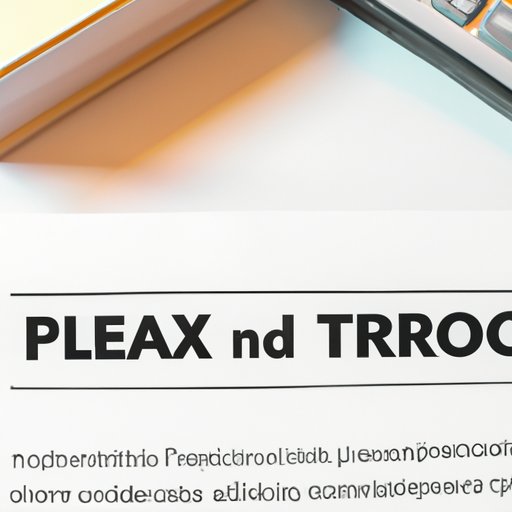
Introduction
Health insurance premiums can be paid in a variety of ways, but understanding pre-tax premiums can help individuals save money on their healthcare costs. In this article, we will explore pre-tax premiums, their benefits, cost analysis, and policy implications. With practical advice and consumer education, we hope to help readers fully utilize the advantages of pre-tax premiums.
Explainer Article: Pre-Tax Premiums and their Benefits
Pre-tax premiums refer to health insurance premiums that are paid with pre-tax dollars, reducing an individual’s taxable income. This benefit is especially advantageous for those with higher incomes, as they may be in a higher tax bracket.
Some benefits of pre-tax premiums include reducing taxable income, saving money on taxes, and increasing take-home pay. Additionally, pre-tax premiums are deducted from paychecks before state and federal income taxes are applied, which can lead to significant tax savings.
One potential disadvantage of pre-tax premiums is that they reduce Social Security and Medicare taxes paid by the individual. However, this can also benefit the individual by reducing their taxable income and increasing their take-home pay.
Cost Analysis: Comparing Pre-Tax and Post-Tax Premiums
When deciding whether to pay health insurance premiums with pre-tax or post-tax money, it is important to consider the cost analysis. One disadvantage of paying with post-tax money is that it increases an individual’s taxable income, resulting in higher taxes paid.
However, paying with post-tax money may also increase the amount of tax deductions available, resulting in lower taxable income. In some cases, this may result in overall savings when compared to pre-tax premiums.
To make an informed decision, it is important for individuals to compare the costs associated with pre-tax and post-tax premiums. There are several online calculators available to help with this process.
Policy Implications of Pre-Tax Health Insurance Premiums
Pre-tax premium payment originated in the Revenue Tax Act of 1942, which allowed employers to offer tax-free benefits to employees. Since then, pre-tax premiums have become a popular means of reducing taxable income for both employers and employees.
From a legislative perspective, pre-tax premiums have implications for healthcare reform. One example is the Affordable Care Act’s employer mandate, which requires employers with 50 or more full-time employees to provide health insurance coverage. Pre-tax premiums help employers meet this requirement while providing cost savings for both the employer and employee.
Employer Perspective on Pre-Tax Health Insurance Premiums
Employers also benefit from pre-tax premiums, as they are eligible for tax incentives. By offering pre-tax premiums, employers can not only save money on taxes but also attract and retain top talent. Additionally, pre-tax premiums may result in lower healthcare costs for the employer, as well as higher employee satisfaction and retention rates.
Consumer Education: Maximizing Pre-Tax Premium Savings
To enroll in pre-tax premiums, individuals must sign up during the open enrollment period. It is important to understand the enrollment process and the benefits of pre-tax premiums to maximize savings. Some practical advice includes consulting with a tax professional, reviewing payroll statements, and using flexible spending accounts to cover out-of-pocket costs.
Additionally, other tips and tricks can help individuals fully utilize the benefits of pre-tax premiums, such as choosing the right health plan, opting for high-deductible plans, and taking advantage of wellness program incentives.
Conclusion
Pre-tax health insurance premiums offer numerous benefits to both employers and individuals, such as reducing taxable income and increasing take-home pay. By understanding pre-tax premiums, cost analysis, policy implications, and consumer education, individuals can make informed decisions and fully utilize the advantages of pre-tax premiums. We encourage individuals to take advantage of pre-tax premiums for their health insurance needs.




